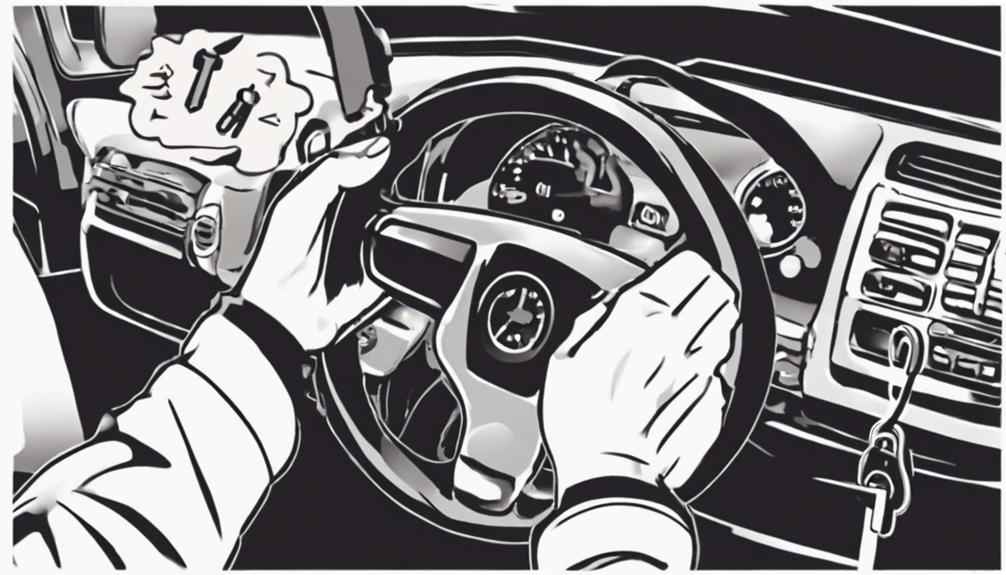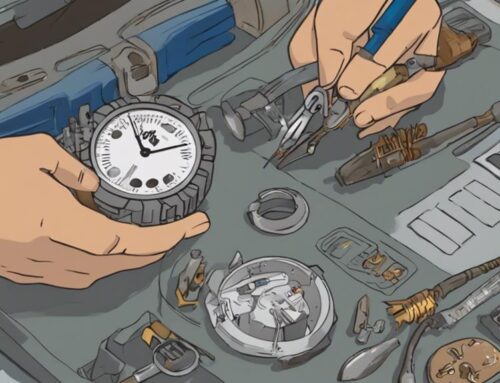If your ignition key won't turn, it can be frustrating and concerning. You might want to start by checking for debris in the ignition or whether the steering wheel is locked. Sometimes, a simple lubricant can do the trick. However, if these quick fixes don't work, you might be wondering if rekeying your ignition could be a viable solution. Understanding the benefits of rekeying can shed light on whether it's the right path for you, but what exactly does that process involve, and could it save you both time and money?
Key Takeaways
- Inspect the ignition lock for debris or damage that may be preventing the key from turning.
- Check if the steering wheel is locked, as this can hinder key movement.
- Apply a graphite-based lubricant to the key and ignition lock to reduce friction.
- If the key won't turn after troubleshooting, consider rekeying for a cost-effective solution.
- Consult a professional locksmith for expert diagnosis and efficient resolution of ignition problems.
Common Reasons for Key Sticking

When your ignition key won't turn, it often stems from a few common issues. Key wear is a primary culprit; over time, the key's edges can become smooth or damaged, preventing proper engagement with the ignition cylinder. Additionally, lubrication issues can arise, as grease or dirt accumulates within the ignition lock, leading to friction that hampers key movement. If the ignition cylinder isn't adequately lubricated, it might seize up, making it difficult for you to turn the key. Regular maintenance of both the key and ignition system can help you avoid these problems. Addressing key wear and ensuring proper lubrication keeps your ignition functioning smoothly, giving you the power and control you expect from your vehicle.
For more information on troubleshooting ignition switch failures, check out this detailed guide
Steps to Troubleshoot the Ignition
Troubleshooting your ignition can help you identify and fix the issue quickly. Start by inspecting the ignition lock for any visible debris or damage. If you see dirt, carefully clean it out. Next, check if your steering wheel is locked, as this can prevent the key from turning. If necessary, gently wiggle the steering wheel while attempting to turn the key. Apply key lubrication to your ignition lock to guarantee smooth operation. Use a graphite-based lubricant, as it's effective without attracting dirt. Finally, test your key in another ignition to rule out a faulty key. If these steps don't resolve the issue, you may need to evaluate more advanced solutions or professional help.
When to Seek Professional Help

Recognizing the right moment to seek professional help is essential for resolving ignition key issues efficiently. If you've exhausted your troubleshooting efforts and your ignition key still won't turn, it's time to consult a professional. Ignition maintenance is important to prevent further damage, and a technician can pinpoint underlying issues that you might overlook. Additionally, if the problem stems from a damaged key, you'll need a key replacement. Don't risk your vehicle's integrity by attempting complex repairs yourself; professionals have the tools and expertise to address these problems effectively. By seeking help promptly, you guarantee that your ignition system remains in peak condition, safeguarding your vehicle's performance and reliability.
Understanding Rekeying and Its Benefits
If you find yourself facing ignition key issues, understanding rekeying can offer a practical solution. Rekeying involves altering the internal pins of your ignition cylinder to work with a new key, effectively securing your vehicle without the need for key replacement. This process can be a quick and cost-effective method of ignition repair, especially if your key is lost or stolen. By rekeying, you regain control over who can start your vehicle while avoiding the expense and hassle of replacing the entire ignition system. Additionally, rekeying can help prevent unauthorized access, enhancing your vehicle's security. It's a powerful option that empowers you to manage your ignition key issues effectively and efficiently. If you're interested in understanding the costs of rekeying your car ignition further, you can find more information here.
How Low Rate Locksmith Can Assist

When your ignition key won't turn, a low-rate locksmith can provide invaluable assistance. These professionals specialize in locksmith services that address ignition problems efficiently. They possess the expertise to diagnose the issue, whether it's a worn-out key, a malfunctioning ignition cylinder, or debris obstructing the mechanism. By utilizing advanced tools and techniques, they can often resolve these issues on the spot, saving you time and frustration. Additionally, if rekeying is necessary, a skilled locksmith can handle that process swiftly, guaranteeing your vehicle's security remains intact. Trusting a low-rate locksmith for your ignition troubles not only saves you money but also assures you're getting reliable service from knowledgeable experts in the field. Understanding the Locksmith Process for Ignition Cylinder Repair









